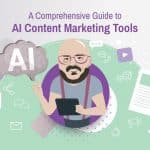Playback speed:
As you sail through the endless digital sea of online material, it’s natural to question whether the piece you’re reading was crafted by a human or churned out by algorithms. Trust me, I’ve shared that moment of doubt—eyebrows raised at an article so polished it hardly seems like the work of mere mortals.
To get to the heart of this enigma, I’ve plunged into research and emerged with fascinating findings. In this piece, I’ll peel back the curtain on what AI-generated content is, exploring its inner workings and examining its profound effects on the craft of writing.
AI-Generated Content [Key Takeaways]
- AI-generated content, such as stories or graphics, is made by machines and can help with tasks such as writing articles fast.
- Tools based on machine learning learn from massive data to create new content that sounds human-like, which is changing the job of content creators.
- The rise in AI use for creating online material impacts search engine optimization (SEO) strategies, as these tools can improve efficiency and focus on creativity.
- While there are benefits, such as faster production and SEO improvement, there’s also a risk of lower quality or plagiarism if not used carefully.
- Future advancements may make AI more adept at understanding the nuances of language, but human oversight will remain important.
What Is AI-Generated Content?
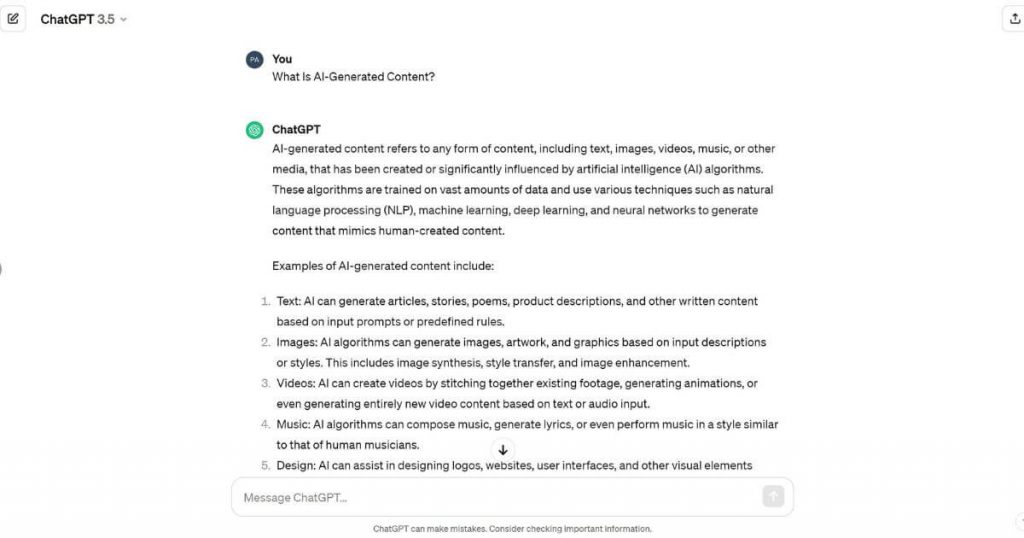
AI-generated content includes text, video, audio, or images, created by machines. This can include stories, blog articles, social media posts, reports, and highly realistic graphics (such as paintings, cartoons, anime, etc.). However, because these AI tools are programmed through machine learning or deep learning processes, they need a starting point to begin.
This can be done by providing them with a topic or question, and after they’ve received the instructions, they take off, ready to produce the desired content. With an AI content generator by your side, you can create text in a fraction of the time it would normally take a human writer to produce content.
How Does It Work?
Machine learning is the magic behind AI-generated content. It is like a smart robot that reads millions of lines from books, articles, and websites. It learns patterns in how we use words and what sentences usually look like. Then, it takes all that knowledge and uses it to write new content that sounds as though it was made by a person.
These tools understand grammar rules and can even pick up on different writing styles. Just give them a topic or a couple of words to start with, and they get going. They can draft full articles or come up with great ideas for your next blog post. If you’re stuck trying to find the right word or phrase, they can suggest suitable options.
The Rise and Hype Around Content Created by Machines
Everyone’s talking about AI-generated content these days because it is changing how we create blogs, images, and entire websites. It has the potential to make our work much easier. Imagine getting all your social media posts written in seconds or images created in no time. That’s the magic of AI.
Here’s what I was able to achieve with Bing’s Image Creator, for example:
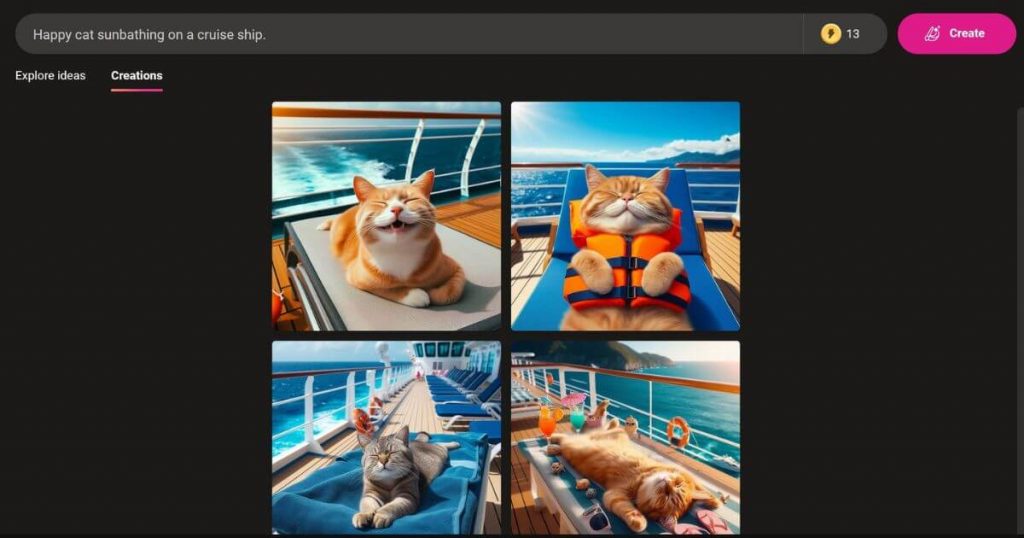
This buzz isn’t just hot air. There are solid reasons behind it. Tools powered by artificial intelligence are becoming smarter at understanding human language every day. They pick out patterns from the data we feed them and turn those into new, fresh content.
However, AI-created content may not produce accurate outputs every time. My article about AI grounding and hallucinations explains why.
The last image with the cat on a cruise ship, for instance, is a bit off. Here’s what I mean (hint: the third flip-flop):
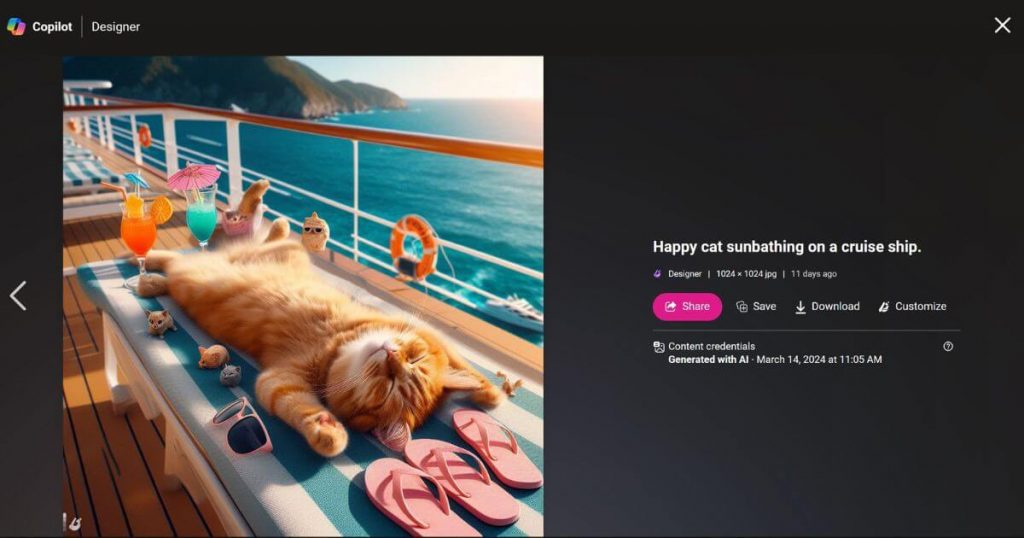
Implications of AI-Generated Content for Writers
As AI-generated content grabs headlines, creators like me face new challenges and opportunities. We need to stay sharp and adapt. AI can crank out articles fast—much faster than any human. It is tempting to lean on this tech for all our content needs. However, we must be smart about it.
The power of AI forces us to level up our game. Creative skills become more valuable as AI handles routine tasks. Our role shifts towards editing, fact-checking, and adding a personal flair that machines can’t yet mimic. We have to ensure quality since readers want stories with heart, not just facts spit out by an algorithm.
AI also opens doors to amazing collaborations between humans and machines in content creation. Content creators are learning how these tools work best for them; whether it’s generating ideas or polishing drafts into shiny pieces of engaging writing that scream personality.
Yes, there’s potential for misuse or laziness if we’re not careful with how much we depend on AI-generated text. However, I choose to see it as my secret sidekick helping me produce high-grade material that stands out in the world of the internet.
Implications of AI-Generated Content for SEOs
AI content generators are powerful tools for SEO experts. They help us work faster and smarter, not harder. I use them to do keyword research, organize data, and create effective title tags and meta descriptions. They’re great at crunching numbers and patterns to suggest what might work best for my website’s SEO.
Still, it’s important to stay sharp while using AI-generated content. Sometimes these programs can get facts wrong or present incorrect information. That’s why I don’t let AI take over completely. Instead, I use it as a helper. It streamlines writing tasks so that I can focus on strategy and creativity.
This is an excerpt from an article that Writesonic wrote about AI in SEO:
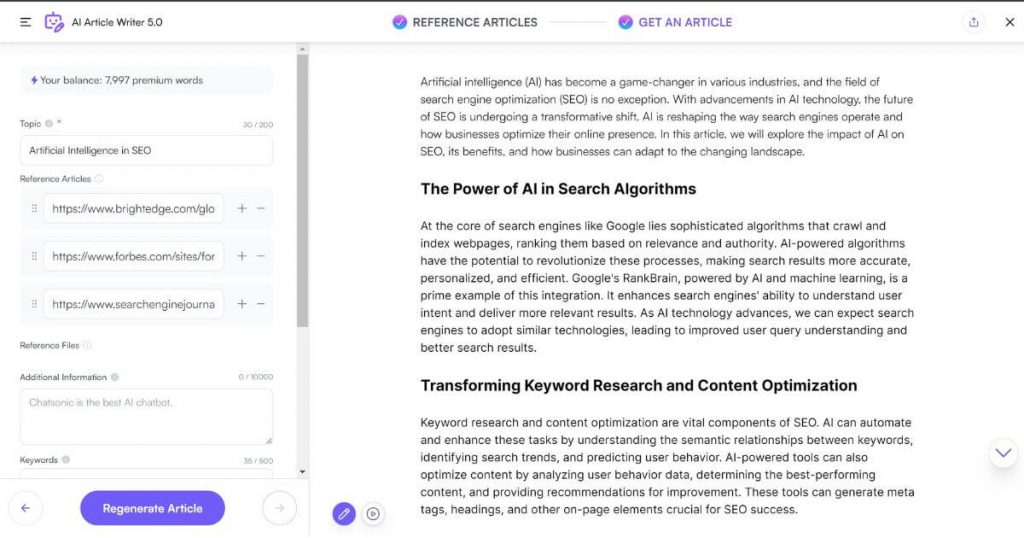
The Benefits of AI Content Generation
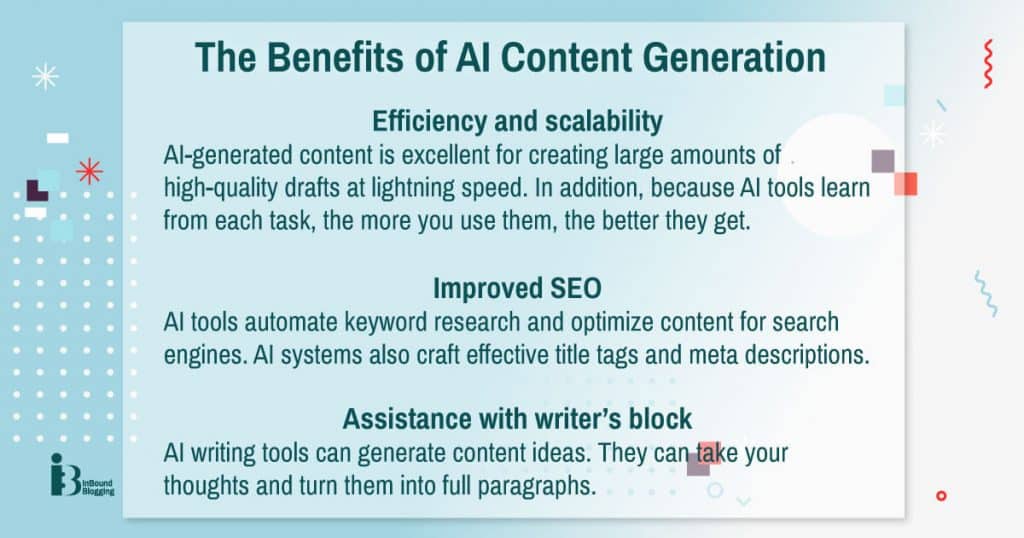
Exploring the benefits of AI-generated content reveals a world of efficiency that revolutionizes how we create and disseminate information.
Efficiency and scalability
Creating high-quality and large amounts of content takes a lot of time and effort. However, with AI-generated content, I’ve found that the process becomes much quicker. These smart tools help me create drafts at lightning speed, which is amazing when I have tight deadlines or numerous projects to juggle. Plus, they’re always ready to go.
Scaling up my content has never been easier, thanks to these AI assistants. Whether it’s blog posts, social media updates, or email campaigns, I can do more without sacrificing quality. In addition, because they learn from each task, the more I use them, the better they get at understanding what I need.
Improved SEO
Efficiency and scalability are great, but let’s focus on how AI-generated content boosts SEO. Imagine having a sidekick that knows exactly what keywords to use and where to place them. AI-powered tools do just that. They automate keyword research and optimize your content for search engines. This means your piece of content could rank higher, get seen by more people, and bring more traffic to your site.
AI systems do not just stop at keywords. It also crafts effective title tags and meta descriptions. These bits of text are essential because they tell search engines what your content is about. Plus, they make people want to click on your link when it pops up in their search results. With AI’s help, you can create these SEO elements quickly without missing out on quality or relevance.
Assistance with writer’s block
Staring at a blank screen can feel like hitting a brick wall. I completely understand this situation. The good news, though, is that AI writing tools can help break through that wall and give you content ideas. As your content assistant, they can take your thoughts and turn them into full paragraphs.
If you’re stuck on what to write next, then simply type in a few ideas, and AI will turn those crumbs into a feast of words. This isn’t about replacing your creativity. It’s about fueling it. Tools like ChatGPT lend me a helping hand when I’m out of steam, nudging my writing process forward without taking over the wheel.
The Limitations of AI-Created Content
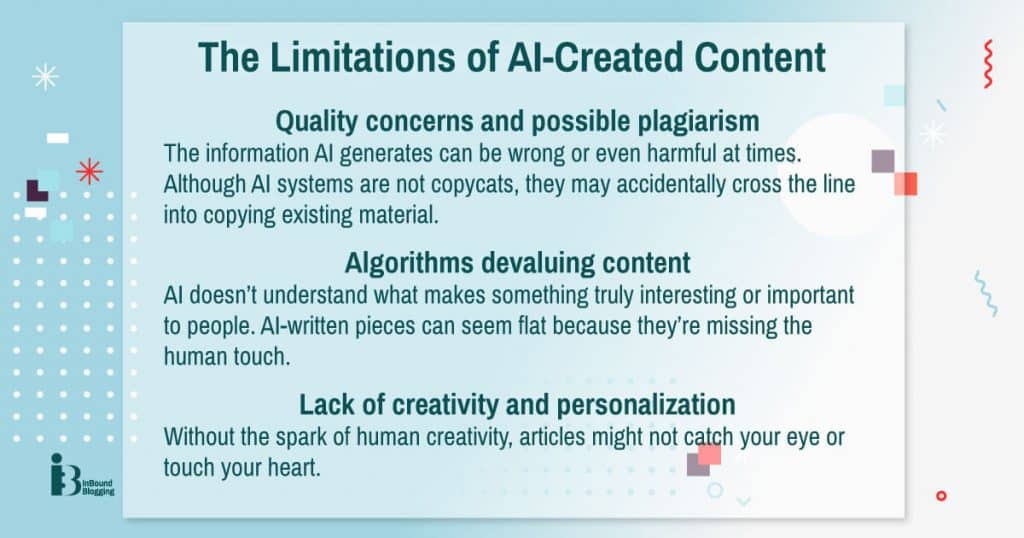
While AI-generated content can be a game-changer in terms of productivity and scale, it’s not without its hitches. Let’s explore what these limitations could mean for our digital landscape.
Quality concerns and possible plagiarism
I’ve noticed that AI content generation tools may not always hit the mark on quality. The information they generate can be wrong or even harmful at times. We need to keep an eye on this, making sure it’s accurate and safe for readers. And if you lean too hard on these AI helpers, your content could end up sounding like everyone else’s.
Now let’s focus on plagiarism. It’s a real issue when we’re talking about AI and writing. Although these smart systems are not copycats, they may accidentally cross the line into copying existing material. Creating unique and personal work is key to staying original and keeping our own voice alive in what we write.
Algorithms devaluing content
Algorithms are smart, but they sometimes miss the mark. They can write tons of content quickly, that’s true. However, this speed often comes at a cost: the value of what we read may drop. This is because AI doesn’t understand what makes something truly interesting or important to people. It just follows the rules and patterns it has learned.
This means AI might create content that looks good on the surface but lacks depth and emotion. Content should grab us, stir thoughts, or spark joy. However, AI-written pieces can seem flat because they’re missing the human touch—the very thing that hooks readers in the first place.
Lack of creativity and personalization
There are other cons to AI-generated content. For example, one big issue is that it can be dull. Without the spark of human creativity, articles might not catch your eye or touch your heart. AI tools crunch data and patterns for content production by generating AI text.
However, these AI generators don’t really understand us much like another person would. This lack of personal touch means the content may miss our unique tastes and interests. Each of us loves content that’s made just for us—from personalized emails to products that meet our needs. AI simply isn’t there yet to make things feel special, designed only for you or me.
How Google and Consumers View AI-Generated Content
Google cares a lot about the content you find online. This search giant wants to make sure it’s useful and of good quality. If I use AI to create spam or poor content, Google might not show my site in search results. They look at numerous factors, including whether the content is helpful and if people enjoy reading it.
People who read content online also have opinions on AI-written content. Some readers don’t mind if a computer helps an author write an article—as long as they get what they need from it. Others might prefer knowing a human wrote it for that personal touch. What really matters is whether the information solves their problem or answers their questions well.
Identifying Content Generated by AI
Sometimes, deciphering whether the content is made by AI can be tricky. It might seem flawless at first glance, but look closely, and you’ll see patterns. Repetition of words and phrases is a dead giveaway. The writing could also miss the human touch—those little quirks and personal stories that only humans share.
If sentences sound too structured or the text lacks emotion, then it’s likely crafted by an AI. Watch for oddly phrased or overly technical sentences that don’t quite fit in. These are signs you’re reading something a machine has created. Keep these tips in mind next time you’re scrolling through articles or social media posts. Alternatively, consider using AI detection tools to help ensure your writing is as original as possible.
I tested Content at Scale AI Detector, and it recognized this text as written by a human:
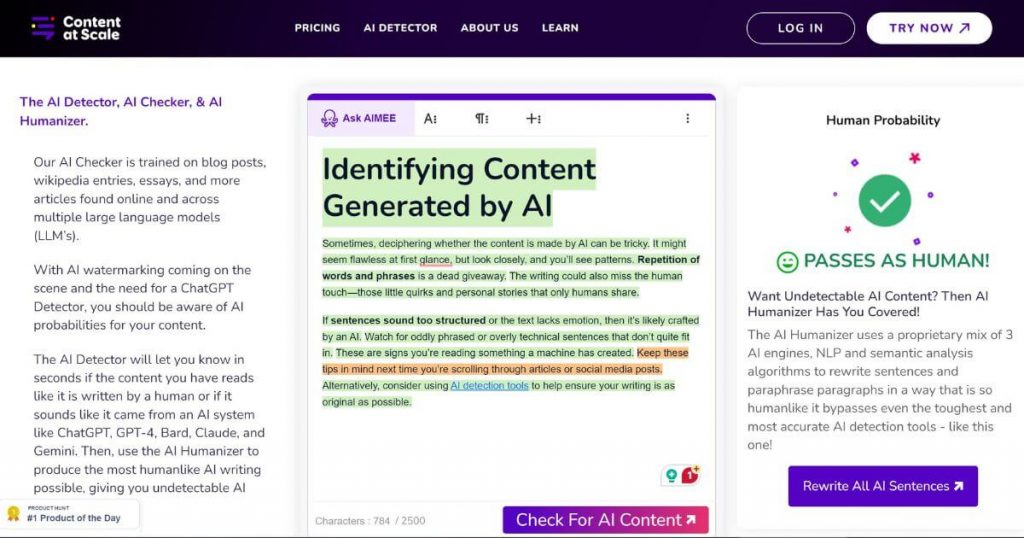
Implementing It into Content Marketing Strategies
I love diving into new tech, and AI-generated content is a game-changer for us in the marketing world. These tools can spin up multiple ideas or drafts faster than you can say “brainstorm.” Let’s say you’re stuck on what to write about. In a matter of seconds, your AI will create a list of topics tailored specifically for your audience.
Using AI also means you don’t have to spend hours researching keywords or figuring out SEO magic. The technology handles the heavy lifting, so your posts climb up those Google rankings without extra sweat from you. Imagine creating customized content at scale. It’s possible now. You plug in some parameters and watch as relevant articles come out polished and ready to go live.
And when it comes time to plan projects, there’s no need to panic. Your AI friend helps lay everything out clearly. It maps out topics and timelines that perfectly align with your strategy goals.
Here, you can read more about AI content marketing tools.
Potential Risks
AI-generated content might get you in trouble with search engines. If your articles sound spammy or robotic, they could hurt your website’s rankings. People want useful content, and not just a series of words thrown together by a machine. You need to be careful and make sure that what you post is helpful.
Sometimes AI can get facts wrong or mix up information. That’s why it’s so important for us to check everything before we share it with others. We have the power to guide AI and keep it on track. This means making sure our content stays true and doesn’t mislead anyone. It takes work, but it keeps us all safe from spreading the wrong ideas.
Biases in AI are tricky, too. They can sneak into articles without us even knowing it, which makes our writing seem less genuine than it should be. We have to stay alert and catch these biases so that our voice remains authentic.
Lastly, if we rely too much on AI tools, our content could end up sounding the same. We want our stories to stand out and show off who we are, not just blend in with everyone else. Remember this: Using AI smartly means mixing it with a good dose of human creativity and care.
Use Cases in Marketing
I’ve been exploring the world of AI-generated content, and it’s packed with exciting possibilities for marketing. Here’s how marketers are leveraging AI to create impactful content:
- Crafting personalized emails: Marketers use AI to analyze customer data and craft personalized emails that speak directly to each recipient’s interests, leading to higher engagement rates.
- Social media posts: AI tools generate creative and timely short-form content for social media, helping brands maintain a consistent online presence without constant manual effort.
- Product descriptions: eCommerce sites leverage AI tools for SEO to write unique product descriptions at scale, making sure every item stands out to potential buyers.
- Blog content: By using AI content tools, companies produce informative blog posts quickly, keeping their websites fresh and drawing in more traffic through regular updates.
- Advertising copy: Writing ad copy can be time-consuming, but AI speeds up the process. Generated content can be used in multiple ways, such as for testing which messages resonate best with the audience.
- Video scripts: Marketers rely on AI models to draft video scripts, ensuring that their message aligns with the brand voice while saving time on content creation.
- Market research reports: With the help of AI, marketing teams compile comprehensive market research reports much faster than traditional methods allow.
- Chatbot conversations: Companies implement chatbots powered by AI that engage customers in natural conversations, improving customer service and gathering valuable insights.
- News articles for PR: Organizations are turning to AI to write news articles and press releases, distributing essential information swiftly and broadly.
- Interactive content quizzes and polls: Fun quizzes and polls that users can interact with can be generated by AI, sparking engagement while learning about consumer preferences.
AI-Generated Writing vs AI-Assisted Writing
From marketing tactics to actual content creation, AI plays a pivotal role. Yet, there’s a significant difference between AI-generated writing and AI-assisted writing. AI-generated writing is all about the machine doing the heavy lifting—think articles, reports, and even poetry composed by algorithms without human guidance after the initial setup. It can create pieces at lightning speed, which is great for meeting tight deadlines or handling large volumes of content.
AI-assisted writing, however, brings humans and machines together. While it relies on artificial intelligence to suggest improvements or generate ideas, it often needs a human touch to make sure everything sounds just right. This partnership allows writers to boost their creativity and efficiency while maintaining control over their unique voice and style. You get the best of both worlds: smart tech suggestions with that irreplaceable human flair.
Should You Use Content Generated by AI?
Now, let’s consider whether you should use purely AI-created content. You have to weigh the pros and cons carefully. On the one hand, AI can quickly give you lots of material. It can help when you’re stuck or need ideas fast. However, remember that it’s not perfect. You might get facts that are off or phrasing that sounds odd.
AI-generated content has its place. If you need multiple SEO-friendly articles or social media posts in no time, then yes, go for it. Just make sure you edit what the AI gives you to add your own touch. Keep an eye on quality and originality. These matter a lot for keeping readers interested and coming back for more.
Future Prospects
Deciding whether to use AI-generated content is one step, but thinking about what’s next for AI in this space opens up a whole new world. The future of AI content looks bright and full of advancements. We’ll see machines getting smarter and more capable of creating complex pieces. They might even grasp the subtle nuances of human emotion in writing.
AI technology will likely become a staple tool for many industries, not just marketing. It could change how we write books, make websites, or run social media campaigns. AdCreative AI, for example, can write high-quality ad creatives in no time. Some people worry that AI may replace human jobs, but others believe it will free us up for more creative tasks instead.
As these tools evolve, staying informed and adapting quickly will be key to keeping up with the pace of change in content creation.
What Do the Experts Think?
In the ever-evolving landscape of content creation, AI-generated content is a hot topic among industry professionals. We’ve gathered insights from industry leaders to explore the challenges and opportunities AI presents.
“For our agency, we are not using AI in our content strategy. AI is not about creation; it’s about regurgitation. It distills what other people have done and strips it of its humanity. We care a lot about SEO as part of our distribution, but our focus is on creating content that is for people first, not algorithms. We’re open to the idea of using AI to enhance our workflow, but as of right now, we will never use generative AI in any of our actual content writing.” — Katelynn Sortino, Content Marketer, Prezly
“It’s not all doom and gloom. There are some exciting opportunities here. For one, AI can be a game-changer when it comes to efficiency. Think about how much time we spend brainstorming ideas, drafting content, and tweaking it to perfection. With AI, we can automate a lot of that grunt work, freeing up more time for fun stuff like strategy and creativity. And let’s not forget about personalization. AI algorithms are getting scarily good at understanding consumer preferences and tailoring content accordingly.” — James Cunningham, Complete Health Optimization Coach, TotalShape
“One of the primary opportunities provided by AI content generators is the significant increase in efficiency and productivity. These tools can produce content at a scale and speed unattainable by human creators alone, enabling businesses to meet the growing demand for fresh, relevant content across multiple platforms. For example, AI can generate news articles, blog posts, marketing copy, and even creative content like poetry and stories, significantly reducing the time and effort required for content production.” — Geet Govil, Inbound Marketing Project Manager, Social Pilot
“There are still a couple of challenges that remain. AI has improved in leaps and bounds, but it still lacks a human element. AI can be biased depending on how it is trained, and this leads to the possibility of it creating offensive content. Then there is the real possibility that creators and marketers will over-rely on generated content, losing that personal touch, which will ultimately drive their audiences away. At the end of the day, it should be viewed as a useful tool that assists with the process of creation.” — Bobby Lawson, Technology Editor/Publisher, Earth Web
Conclusion
AI-generated content is changing how we create and share ideas. But remember, it’s not perfect. You still need creativity and the human touch. As we move ahead, let’s use AI wisely to make our stories even better.
Interested in all things AI? Here’s my extensive blog post about AI terms.
FAQ
Why should I care about using AI to generate content?
Using AI can help speed up the content creation process. It’s great for making work faster, such as writing articles, crafting marketing messages, or even personalizing content for different people.
Can an AI replace my job as a content writer?
Not quite. While an AI can generate written content really fast, it might not understand everything perfectly. That’s where you come in: to make sure the content can help your readers by sounding just right when you add that human touch.
Are there downsides to using AI-generated content?
Yes, there are some cons. Sometimes the AI can produce content and information that isn’t exactly on point or needs more detail. That’s why checking over what the AI generates is super important.
How does this technology shape what we see online?
AI-powered content is popping up all over—from website articles to social media posts. It means we’re often reading something a computer helped write.
Will my readers know if I use AI-generated material?
You might just surprise them. Many AI algorithms and tools are getting good at sounding as though people wrote the content. However, always double-check so your own style shines through.


